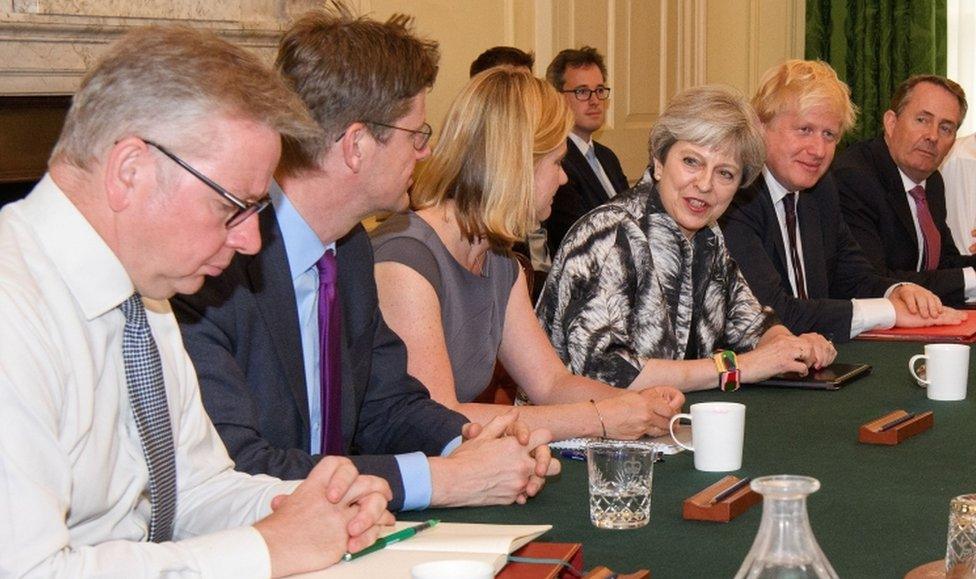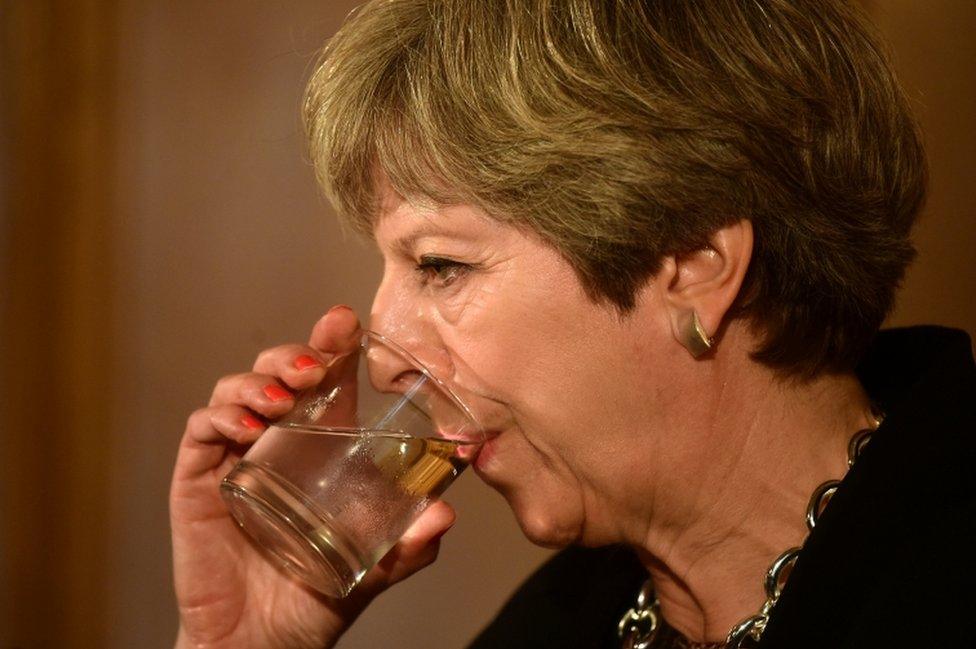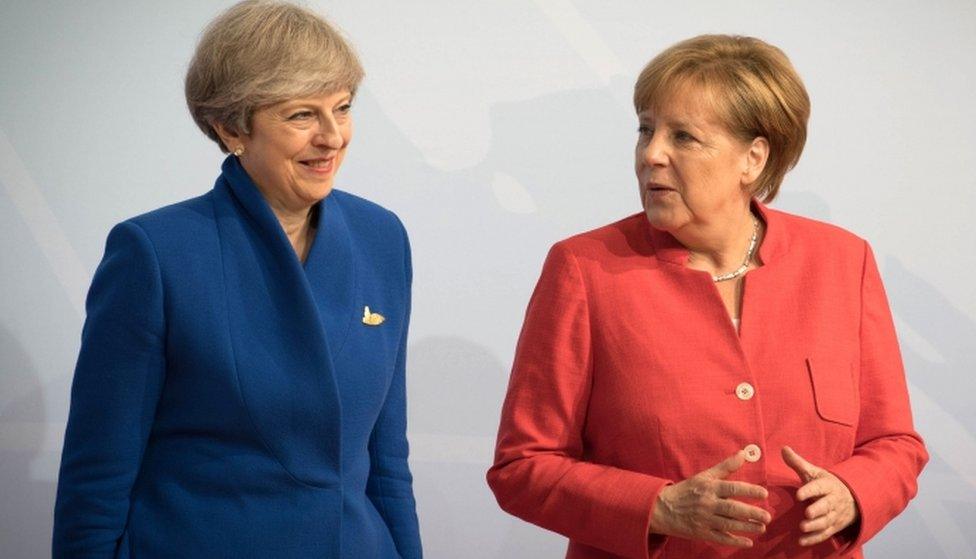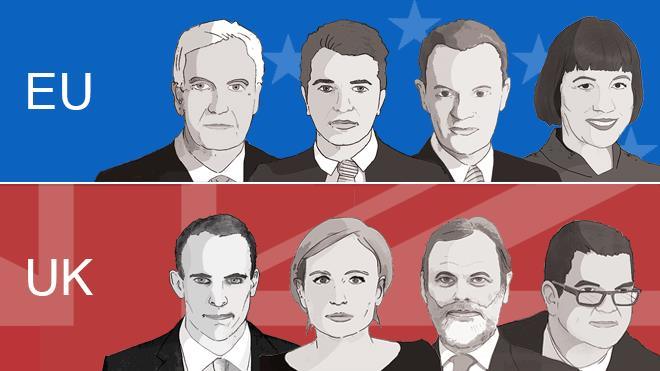EU leaders hungry for Brexit intel
- Published

British ministers have called for several different kinds of Brexit - many of them conflicting
Whichever part of Europe I travel to at the moment, I find myself faced with political and business leaders desperate for intel on the UK, so that come the end of the interview I'm conducting, the tables are turned on me - to the tune of "Finished? OK, good. Now can you tell me anything about Brexit and the path the UK is going to take?"
Europeans are bemused, confused and hungry for information.
They listen to the prime minister, who says nothing has changed since the election, that she is carrying out the will of the British people... Yet Berlin, Brussels and Paris hear a cacophony of influential voices in and outside the Cabinet, who appear to be calling for all manner of things - hard Brexit, soft Brexit, an immigration-focused or a trade-led Brexit...
In the absence of being officially informed otherwise, the EU is framing its negotiating positions around the Article 50 letter Theresa May sent back in March, triggering the formal Brexit process and pointing to a UK departure from the European Customs Union and Single Market.
But Europeans ARE leaving wiggle room for other Brexit scenarios. The reason, they tell me: They fear Theresa May may well be a here today, gone tomorrow kind of prime minister, so they take her words and the words of her chief Brexit negotiator with a pinch of salt.
Brussels had hoped for a decisive result in last month's general election.
Eurocrats readily admit it was never their business which political party had the upper hand in the UK - that was a domestic issue - but what they did hope for, they told me, was for a strong prime minister to emerge, able to make concessions - some of them possibly painful ones - that the EU thinks will be necessary in order to reach a good Brexit deal.

Europeans fear Theresa May may be a here today, gone tomorrow kind of prime minister
The phrase Brexit means Brexit has now become a bit of a tongue-in-cheek catchphrase in European circles, to use when you have no idea what to say in a particular situation or you don't want to be drawn on the details of any particular subject.
Not that EU leaders are laughing about Brexit. There is little Schadenfreude about.
I was in Berlin recently, where many politicians are keen anglophiles - but more to the point they realise that if the UK economy nosedives that will have a considerable impact on the rest of Europe too.
You actually find quite a lot of sympathy in Germany for Theresa May and the political situation she finds herself in post-election.
German politicians are also mourning the loss of the UK from EU decision-making. The two countries were closely aligned when it came to attempts to complete the single market, and make the EU more streamlined and competitive. Now Germany fears more protectionist Mediterranean nations may gain the upper hand.
But the UK says it is leaving and there is little appetite in Berlin to make huge concessions. Germany is concerned with the EU's future.
Angela Merkel insists life outside the EU cannot be seen to be more attractive than inside. There cannot be having your cake and eating it for the UK - leaving the EU but just keeping the convenient bits - otherwise, she fears, other countries might be tempted to walk out too.
There is a wholesale rejection at German government level of the idea that a favourable trade deal will be done with the UK to keep up German car sales.
You just don't understand how we Germans think, one high-level contact told me. Europe was Germany's chance of a new beginning, a new respectability after the horrors of the Nazi times - European Unity comes first, before any car sales. European politics trump trade and economics, he said.
Of course Angela Merkel would love Brexit not to happen. I haven't met a European leader yet who was happy about Brexit. But Berlin thinks a reversal is unlikely - however much Wolfgang Schauble, the German finance minister, repeats out loud that the door is always open.

Germany's Angela Merkel will miss the British influence within the EU
His finance ministry is preparing for a huge row this autumn over what it sees as financial commitments the UK must honour when it leaves, and what the UK views as an EU exit bill.
The EU is factoring in flexibility over the final amount to be paid, but Berlin is unsure the UK government can sell any amount to the British public.
There was no talk before the referendum that Brexit would cost the British taxpayer money, one high-level source told me - so how will they react? They were just told leave the hideous EU and everything will be great.
It's hard to find an upbeat mainstream European voice when it comes to Brexit; most leading politicians fear everyone will come off worse.
The talk of the town right now is rather sartorial in tone. If negotiations are successful - and after a still-to-be-agreed transition period - Eurocrats speak of a tailor-made rather than an off-the-shelf deal with the UK, as in a specially-designed deal rather than a copy of the EU's agreement with Norway, Canada or Turkey for example.
European businesses - like UK ones - are being warned of the possibility of a so-called cliff-edge, no-deal scenario. But my talks with leaders across the continent make clear: the Europeans want a deal with the UK. They need a deal, they'll work towards a deal - but, they insist - not at any price.
- Published17 November 2018

- Published30 December 2020

- Published12 June 2017
- Published9 June 2017
- Published30 May 2017
